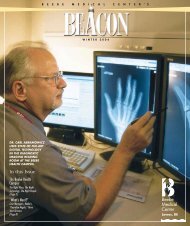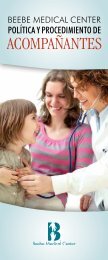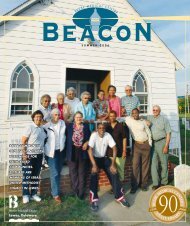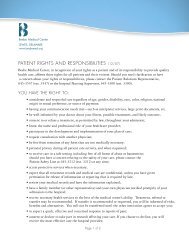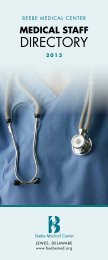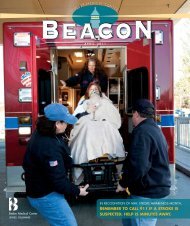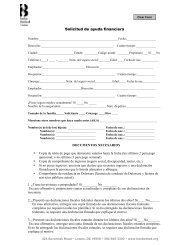BEACON â July 2009 - Beebe Medical Center
BEACON â July 2009 - Beebe Medical Center
BEACON â July 2009 - Beebe Medical Center
- No tags were found...
Create successful ePaper yourself
Turn your PDF publications into a flip-book with our unique Google optimized e-Paper software.
Lewes, DelawareJ u l y 2 0 0 9
Walk-in Carefor the Beach Community<strong>Beebe</strong> Health <strong>Center</strong> WALK-INCARE opens in the RehobothBeach KmartNurse practitioners and physicianassistants offer non-emergencycare at <strong>Beebe</strong> Health <strong>Center</strong>Walk-in Care. Above, LeighsaMerrick, FNP-BC, and AaronBlock, PA, treat patients IngridTorres, of Rehoboth Beach (topleft); Sally Kelly, of Millsboro(top right); and Beth Evans, ofBishopville, Maryland (center).Cover: Stephanie Whitcomband her 18-month-old daughterAbby are seen here with LeighsaMerrick.<strong>Beebe</strong> Health <strong>Center</strong>provides walk-in,non-emergency carefor residents whoseprimary care physicianis unavailable.Rehoboth Beach now offers residents and visitorsalike a healthcare facility offering convenient andaffordable care to those with non-emergency ill-nesses and injuries. No longer will people sufferingfrom an earache, painful sunburn, a sprained ankle,or a head-splitting sinus infection find it impossibleto get a doctor’s visit.As the <strong>2009</strong> summer season took off, <strong>Beebe</strong>Health <strong>Center</strong> Walk-in Care opened in the RehobothBeach Kmart on Coastal Highway, Rehoboth Beach.The year-round health center represents a new,national trend in healthcare that has brought medicalprofessionals into retail stores to treat minor illnesses.So far, there are more than 1,000 of thesetypes of convenient, in-store clinics across thenation. These centers treat people with and withouthealth insurance on a drop-in basis. Appointmentsare not necessary. <strong>Beebe</strong> Health <strong>Center</strong> Walk-inCare represents a new relationship between <strong>Beebe</strong><strong>Medical</strong> <strong>Center</strong> and Kmart, a subsidiary of SearsHoldings, Chicago.“In-store clinics are becoming a popular trendacross the country because they provide care bytrained medical providers when it is needed, at aconvenient locationand at a reasonableprice,” says DennisKondash, DO,<strong>Medical</strong> Director.“These clinicsare not intended toreplace the familyphysician for longtermtreatment ofpatients. They alsoDennis Kondash, DO, is <strong>Medical</strong> Directorof the <strong>Beebe</strong> Health <strong>Center</strong> Walk-in Careat the Rehoboth Beach Kmart.2
In the event of a life-threatening illnessor accident, patients are advised to dial 911.are not intended to replace emergency room care. Continuous care of patientsand follow-up will be ensured as we will be forwarding information aboutpatients to their primary care physicians after each visit, with permission fromthe patients.”<strong>Beebe</strong> Health <strong>Center</strong> is designed to provide walk-in, non-emergency care forresidents whose primary care physician is unavailable. The center also providesnon-emergency care to visitors who do not have a local physician or do not feelthat it is necessary to go to the hospital emergency room.The clinic has exam and treatment facilities for adults and children age sixmonths and older. It is staffed with a receptionist and a nurse practitioner orphysician assistant, with an on-call physician. These medical professionals canrefer patients to <strong>Beebe</strong> <strong>Medical</strong> <strong>Center</strong>’s main hospital and Emergency Departmentif patients need more advanced care or diagnostic testing.Services include care for common illnesses such as upper respiratory infections,ear infections, gastrointestinal complaints, sprains, and skin conditionssuch as athlete’s foot, poison ivy, and ringworm. Some vaccines also will beoffered. They include flu, pneumonia, Td (Tetanus, Diphtheria), and Zostavax(for shingles).In the event of a life-threatening illness or accident, patients are advisedto dial 911. nVisit <strong>Beebe</strong> Health<strong>Center</strong> Walk-in CareWhen you are suffering from:• Upper respiratory infections such as sore throats,sinus infections, flu, laryngitis• Ear infections• Eye infections• Sprains and minor injuries• Gastrointestinal complaints• Skin problems such as athlete’s foot, rashes, burns,ringworm, or poison ivySome vaccinations also willbe available for:• Flu• Pneumonia• TetanusClinic hours:• Monday through Friday, 9 a.m. to 9 p.m.• Saturday, 9 a.m. to 7 p.m.• Sunday, 9 a.m. to 5 p.m.AddressKmart19563 Coastal HighwayRehoboth Beach, DE 19971Leighsa Merrick, FNP-BC,examines Joseph Torres,of Rehoboth Beach.3
Think Safety This SummerCoastal Delaware offers a place for summer fun, with its ocean fishing, beachesand inland waterways, amusement parks, campgrounds, swimming pools, and golfcourses. But just like any other place, unexpected injuries happen, and we need tothink about safety first. <strong>Beebe</strong> <strong>Medical</strong> <strong>Center</strong> is ready for you in an emergency. OurLevel III Trauma <strong>Center</strong>, established in 1999, has been continually re-verified by theCommittee on Trauma of the American College of Surgeons. <strong>Beebe</strong> has five traumasurgeons available 24 hours a day and other qualified personnel who are able tostabilize and care for trauma patients. Each year more than 600 patients are treatedat <strong>Beebe</strong> for traumas, including injuries suffered from motor vehicle collisions,boating accidents, ATV rollovers, dangerous riptides, falls, and bicycle accidents.<strong>Beebe</strong>’s Trauma Department works hard to help those in our community avoidthese often serious injuries. Three Trauma Team members, Jen Whaley, RN, CCRN,Trauma Program Manager; Cheryl Littlefield, RN, Trauma and Emergency ManagementCoordinator; and Michelle Arford-Granholm, CSTR, Trauma Registrar, regularlygo out into the community to educate people on injury prevention. They take partin safety checkpoints, safety days at local parks and schools, and speak to manyin the community. As <strong>Beebe</strong>’s Injury Prevention Team, they participate in SafeKids Delaware and are members of the Injury Prevention Coalition of Delaware.Included here are some of their reminders to help you avoid a serious injury.Water Safety• Always swim or surf at a beach thatis patrolled by lifeguards.• Never swim alone.• Don’t run and dive into the waterif you do not know how deep it is.• If caught in a rip current, float withit and signal for help.• Understand the posted flag warnings.Head InjuriesMain causes include motor vehicle collisions, bicycle or motorcycle wrecks, fallsfrom windows, and falls around the house. Head injuries can be life-threatening.Seek emergency care if you notice any of the following symptoms:• Any symptom that is getting worse, such as headache, nausea, or sleepiness• Nausea that doesn’t go away• Changes in behavior, such as irritability or confusion• Dilated pupils (pupils that are bigger than normal) or pupils of different sizes• Trouble walking or speaking• Drainage of bloody or clear fluids from ears or nose• Vomiting, seizures, and weaknessor numbness in the arms or legsBiking & In-line SkatingAlways wear helmets and other fullprotectivegear. Always maintain control.Bike and skate in areas withouttraffic. Don’t bike or skate at nightwhen others can’t see you and youcan’t see obstacles in your path.Play it Safe!<strong>Beebe</strong> Trauma Team members take part in the DelDOT bike safetycheckpoints. Pictured (left to right) are Cheryl Littlefield, RN, andMichelle Arford-Granholm, CSTR.4
Boating Rules• Wear a life jacket.• Know boating navigation rules.• Never be under the influence of alcohol or drugswhile operating a boat.• Do a safety check (www.vesselsafetycheck.org).More safe boating information can be found atwww.safeboatingcouncil.org.Dog Bite Prevention (CDC)To help prevent children from being bitten by dogs,teach the following basic safety tips and review themregularly:• Do not approach or play with an unfamiliar dog.• Do not run from a dog or scream.• Remain motionless (e.g., “be still like a tree”)when approached by an unfamiliar dog.• If bitten, immediately report the bite to an adult.Playground Safety• Always supervise children on playgroundequipment.• Be sure children play on age-appropriateequipment on cushioned surfaces.• Do not dress children in clothes that havestrings that can cause strangulation.• Watch for moving swings and other equipmentthat may cause injury.ATVs pose significant risk• ATVs (All Terrain Vehicles) can be unstable andmore likely to roll over.• The most common injuries are head, trauma to thespine and abdomen, and fractures and dislocations.• Children 16 years and under account for 28 percentof ATV casualties.• In Delaware, ATVs are not allowed on paved roads;all riders must wear a helmet; operators must beat least 12 years old, unless on parents’ land; andall ATVs must be registered and renewed everythree years.Always dial 911 forlife-threatening emergencies.Don’t forget whathappens on the roadBUCKLE UP• Wearing a seatbelt cuts in half your risk of beingkilled or seriously injured in a crash.• Strong seatbelt laws protect families. In Delaware,when parents are buckled up, 90% of the timechildren are too. However, when adults don’t wearseatbelts, child restraint use drops to just 59%.Rules of the RoadThere is another very important safety tip tothink about. In the summer months our local roadsand highways are clogged with cars, SUVs, vans,trucks, motorcycles, and bicycles. Some people drivefast and some drive slow. The most important thingis to obey the rules, drive defensively, and do notdrive aggressively.Aggressive driving in Delaware is blamed formore than half of all fatalities in motor vehiclecrashes by the state Office of Highway Safety.Aggressive driving includes speeding, changing lanesoften, tailgating, and driving under the influence.<strong>Beebe</strong> <strong>Medical</strong> <strong>Center</strong>’s Trauma Registry reportsthat in the Emergency Department traffic-relatedinjuries are the second most common injuries(after falls) that lead to hospitalization, surgery,or the need for transportation to a higher levelof trauma care. nCell phone use while driving isa distraction that can be deadly.Remember, Delaware law prohibitsdrivers with Learner’s Permits touse cell phones.<strong>Beebe</strong> Trauma Team memberswho focus on injury preventionare (left to right) Cheryl Littlefield,RN; Michelle Arford-Granholm,CSTR; and Jen Whaley, RN, CCRN.5
Julie Holmon, MD, <strong>Medical</strong>Director of the Hospitalistprogram, discusses a patient’sdiagnosis with <strong>Beebe</strong> radiologistMichael Ramjattansingh, MD.A Team Approach for Quality CareHospitalist TeamJulie Holmon, MD, <strong>Medical</strong> Director of the Hospitalist program at <strong>Beebe</strong><strong>Medical</strong> <strong>Center</strong>, reviews records of hospitalized patients when she comeson duty. The previous night had been a busy one, she observes. One of thefloor nursing supervisors called the hospitalist on duty at 2 a.m. to check ona patient, and Dr. Holmon has been asked to discuss the patient’s conditionwith the adult daughter later that morning. She sees that there is a patientwho needs a carotid duplex scan. Another patient has been closely watcheddue to respiratory problems caused by chronic obstructive pulmonary disease(COPD), all too common in a community with an older population ofwhich many have smoked. As she leafs through the pages, the two otherhospitalists on duty greet her.“We have a good team that works well together,” she says. “We believethat the Hospitalist program is one that enhances communication betweenthe patients, their families, and our hospital staff. It definitely improvesoverall patient care.”<strong>Beebe</strong> <strong>Medical</strong> <strong>Center</strong> has 10 hospitalists. They all are Board Certified,with the majority of their certifications in internal medicine, a branch ofmedicine that deals with the diagnosis and nonsurgical treatment of diseasesaffecting the internal organs of the body, especially those in adults.As hospitalists, they specialize in caring for hospitalized patients. ThereJennifer Walker, MD, sits in front of an Emergency Department computer.6
are at least three hospitalists on duty during the day and one during the night.They are all based in the hospital and do not have separate, private practices.“I believe having a Hospitalist program makes it easier to get tests done andto order studies. Also, by working with case managers, we can make sure thata patient gets follow-up care after leaving the hospital,” Dr. Holmon explains.Over the past decade, <strong>Beebe</strong> <strong>Medical</strong> <strong>Center</strong>, like other hospitals across thecountry, observed that with the advent of better medications, more stringentpayer rules regarding hospital stays, and the increased use of outpatient facilities,patients admitted to a hospital often are older and more seriously ill. They aremore likely to be suffering from chronic and complex diseases. Many have survivedorgan transplants and multiple cancer treatments. Consequently, they needmore care, more often, and a hospital-based physician becomes a necessity tomaintain quality care. While teaching hospitals already had physicians on duty 24hours, community hospitals did not. The Hospitalist program furnished the solution.Hospitalists provide an around-the-clock physician presence and do notdepend solely on Emergency Department physicians who are responsible to carefor patients suffering life-threatening illness and injury. Hospitalists, who becomefamiliar with individual medical centers, also are in a perfect position to recommendopportunities for improvement and to develop new methods of care.An Innovative Approach at <strong>Beebe</strong><strong>Beebe</strong> <strong>Medical</strong> <strong>Center</strong> introduced the hospitalist concept in 2005 as a way tomaintain the quality and continuity of care of its hospitalized patients. It startedout with one physician who admitted patients into the hospital who had noHospitalist Anas Atrash, MD, reviews a patient’s chart before reporting back tothe primary care physician.“We believe thatthe Hospitalistprogram is onethat enhancescommunicationbetween thepatients, theirfamilies, and ourhospital staff.”—Julie Holmon, MDJulie Holmon, MD, checks on a patient inthe Orthopaedic Department at <strong>Beebe</strong>.7
Borislav Antonov, MD, andLinda A. Choy, MD, are amongthe team of 10 Hospitalists at<strong>Beebe</strong> who offer hospitalizedpatients 24-hour, in-house,physician coverage.physician of their own. Today, hospitalists at <strong>Beebe</strong><strong>Medical</strong> <strong>Center</strong> can admit any patient who needsto be hospitalized. They will follow up with thepatient’s primary care physician and communicatewith specialists if necessary. Hospitalists monitor thepatient’s medical care, are available when needed,and serve as the physician on <strong>Beebe</strong> <strong>Medical</strong><strong>Center</strong>’s Rapid Response Team, a select group ofmedical specialists who can be called by anyone,such as a nurse or family member, who fears thata patient’s condition is worsening.“Our Hospitalist program is now fully staffed andHospitalist Maneshkumar Patel, MD,working excellently,” says Vikas Batra, MD, Chief of discusses a patient’s diagnosis withMedicine at <strong>Beebe</strong> <strong>Medical</strong> <strong>Center</strong>. “It gives the primarycare physician time to concentrate on the office and allows the hospitalizeda family member.patient to be seen by a physician in a timely manner, day or night.”<strong>Beebe</strong> <strong>Medical</strong> <strong>Center</strong> is proud to have initiated its Hospitalist program,which is an integral part of the quality and continuity of care provided to itspatients.<strong>Beebe</strong> <strong>Medical</strong> <strong>Center</strong>’s HospitalistsJULIE HOLMON, MD<strong>Medical</strong> DirectorDr. Holmon is Board Certified in bothInternal Medicine and Pediatrics. Sheearned her medical degree at JohnsHopkins University School of Medicine,Baltimore. Dr. Holmon’s residency inInternal Medicine/Pediatrics was completedat Christiana Care Health Systems inNewark, Del.AFSHIN ADILI-KHAMS, MDDr. Adili-Khams is Board Certified inInternal Medicine. He earned his medicaldegree at University <strong>Medical</strong> School ofDebrecen in Debrecen, Hungary. He didhis residency in Internal Medicine atTrinitas Hospital in South Orange, N.J.,and a fellowship in Geriatrics at AlbertEinstein <strong>Medical</strong> <strong>Center</strong> in Philadelphia.BORISLAV ANTONOV, MDDr. Antonov is Board Certified in InternalMedicine He earned his medical degree at<strong>Medical</strong> University–Sofia in Sofia, Bulgaria.His residency in Internal Medicine wascompleted at Crozer Chester <strong>Medical</strong><strong>Center</strong> in Upland, Pa. He earned hisMasters of Public Health at Johns HopkinsUniversity Bloomberg School of PublicHealth.ANAS ATRASH, MDDr. Atrash is Board Certified in InternalMedicine. He earned his medical degreeat Damascus University, School of Medicine,Syria. He completed his internship and residencyat Temple University Memorial <strong>Medical</strong><strong>Center</strong> in Philadelphia with endocrinologyand diabetes training.Linda A. Choy, MDDr. Choy is Board Certified in InternalMedicine. She earned her medical degreeat the University of Pittsburgh School ofMedicine in Pittsburgh, Pa. She completedInternal Medicine residency programs atSyracuse University Hospital Health Science<strong>Center</strong> in Syracuse, N.Y., and at North ShoreUniversity/Cornell <strong>Medical</strong> College in Manhasset,N.Y. She did a fellowship at NorthShore University/Cornell <strong>Medical</strong> College.GEORGE M. KLUCHNIK, MDDr. Kluchnik is Board Certified in InternalMedicine. He received his medical degree atGeorgetown University School of Medicine inWashington, D.C., where he also completedhis residency in Internal Medicine.MANESHKUMAR PATEL, MDDr. Patel is Board Certified in InternalMedicine. He earned his medical degree atThe Government <strong>Medical</strong> College in Indiaand did his residencies in Internal Medicineat Lutheran <strong>Medical</strong> <strong>Center</strong> in Brooklyn, N.Y.,and at Jamaica Hospital in Jamaica, N.Y.EMAD E. SHOUKRY, MD Dr. Shoukry is Board Certified in InternalMedicine and Geriatric Medicine. Hereceived his medical degree from AinShams School of Medicine in Cairo, Egypt.He completed his Internal Medicine residencyin Paris, France. He also completedanother Internal Medicine residency programat Newton Wellesley Hospital inNewton, Mass. He subsequently completeda Geriatric fellowship at theUniversity of Maryland in Baltimore.PREACHESS VELLAH, MD Dr. Vellah is Board Certified in Geriatricsand Internal Medicine. She earned hermedical degree at the University ofZimbabwe <strong>Medical</strong> School, and she completedher residency in Internal Medicineand a fellowship in Geriatric Medicineat the University of Tennessee <strong>Medical</strong>School in Knoxville.JENNIFER WALKER, MD Dr. Walker is Board Certified in InternalMedicine. She earned her medical degreeat New York School of Medicine andcompleted her residency in InternalMedicine Primary Care at GeorgeWashington University.8
Rapid Response TeamA 911 System within the Hospital<strong>Beebe</strong> <strong>Medical</strong> <strong>Center</strong> nurse Laura Smith, RN, MSN, remembers calling theRapid Response Team when she was working in the <strong>Medical</strong>-Surgical Unit onthe third floor.“The patient started to have some trouble breathing and I became concerned,”says Ms. Smith. “We know that the Rapid Response Team brings togethera variety of expertise from different areas of patient care. Each member of theRapid Response Team has a different focus when assessing a patient in needand is able to identify a patient’s needs and act quickly.”Ms. Smith says that floor nurses appreciate being able to call the RapidResponse Team when they are concerned about the condition of a patient.All staff is educated about <strong>Beebe</strong>’s Rapid Response Team and its positive effecton patient outcomes.“Our goal is to prevent the patient’s condition from further deterioration,”says Ms. Smith, who teaches at <strong>Beebe</strong> School of Nursing, “and to get the patientthe optimal care as quickly as possible.”<strong>Beebe</strong> <strong>Medical</strong> <strong>Center</strong> introduced the Rapid Response Team concept in2005, soon after the concept was recommended by the Institute for HealthcareImprovement in 2004 as part of the Saving 100,000 Lives Campaign, the firstnational campaign focused on saving lives by implementing new healthcareRapid Response Team MembersPatient in Distressphysicianor nursepractitionerCriticalCareNurseEKGTechnicianFloorNursingSupervisorThe Rapid Response Team arrives to evaluate and treat a patient. Members are (left to right) respiratory therapistBobette Clay, RRT; Julie Holmon, MD, leading the team; and critical care nurse Jennifer Mancuso, RN.RespiratoryTherapist“The Rapid Response Team is a critical care team within the hospitalthat is available 24 hours to respond and reverse a catastrophicmedical event, whether being suffered by a patient, visitor, or staffmember of the hospital.” —Denise Pecora, RN, APN, MSN, CRNP9
Rapid Response Team membersbring their expertise to thebedside. Members here are(left to right) critical care nurseJennifer Mancuso, RN; respiratorytherapist Bobette Clay, RRT; nursepractitioner Denise Pecora, RN,APN, MSN, CRNP, leading theteam; and <strong>Beebe</strong> pharmacistMichael Fraundorfer, PharmD.techniques proven to improve patient care andprevent avoidable deaths.At first, through the evolution of developing sucha team, <strong>Beebe</strong> <strong>Medical</strong> <strong>Center</strong>’s team was made upof a critical care nurse and a respiratory therapist.The floor nursing supervisor also was on hand.Then, in early 2008, it was expanded to includea medical provider such as a physician or a nursepractitioner, as well as an EKG technician. VicePresident of Patient Care Vendla Esler, RN, BSN,MBA, CNAA, BC, was instrumental in changing thepolicy. She worked closely with critical care nursepractitioner Denise Pecora, RN, APN, MSN, CRNP,who had experience working on rapid responseteams before joining <strong>Beebe</strong> <strong>Medical</strong> <strong>Center</strong>.“I felt very strongly that the team needed a physicianor a critical care–trained nurse practitioner whocould prescribe and treat immediately,” Ms. Eslersays. The committee members at <strong>Beebe</strong> <strong>Medical</strong><strong>Center</strong> she worked with, all with expertise incritical care, included Betsy Frederick, RN, MS,CCRN, Director of the Critical Care Unit and theCardiovascular Step Down Unit; Kathy Cannatelli,RN, BSN, Nurse Manager of the Critical Care Unitand of the Cardiovascular Step Down Unit; JulieHolmon, MD, <strong>Medical</strong> Director of the Hospitalistprogram; nurse practitioner Denise Pecora, whoworks in the Interventional Cardiology program;and pulmonologist and critical care physicianMichael Salvatore, MD.<strong>Beebe</strong> <strong>Medical</strong> <strong>Center</strong>’s written policy on theRapid Response Team, updated last year, detailswhen any staff member should initiate the team bytelephoning a hospital extension number. After listingsuch reasons as an increase or decrease in aheart rate, altered mental status, or acute bleeding,the policy ends with “the primary nurse has no realclinical indicators; however is concerned or worriedabout the patient.”Vikas Batra, MD,Chief of Medicineat <strong>Beebe</strong> <strong>Medical</strong><strong>Center</strong> and Chairmanof the Special CareCommittee, says theteam is working welland has many advantages.“It improvesthe comfort level ofthe nurses if there isVendla Esler, RN, BSN,MBA, CNAA, BC, VicePresident of Patient Care,is a strong advocate ofrapid response teams.Vikas Batra, MD, Chief of Medicine,says rapid response teams are anasset to patient care.10
Giving Backa problem, and anyone, even a family member,can activate it. It allows us to identify a patientbefore a cardiac or pulmonary arrest occurs andto get that patient to a more appropriate unit,such as intensive care.”Nurse practitioner Denise Pecora, who has yearsof experience in critical care, acts as a team leaderwhen she is available. Otherwise, a hospitalist, whois a hospital-based physician, will respond. Becauseof the makeup of a Rapid Response Team, morethan one can be called at the same time.“The team has extensive knowledge and background,”Ms. Pecora says. “Today the acuity of thepatients has increased. People have more complexproblems and are living longer, and they are sickerwhen they get to the hospital.”Rapid response teams are proving to improvepatient outcomes nationwide.“The important thing is that this is a hospitalbasedresponse team,” Ms. Pecora says. “The RapidResponse Team is a critical care team within the hospitalthat is available 24 hours to respond to andreverse a catastrophic medical event, whether beingsuffered by a patient, visitor, or staff member of thehospital.”Laura Smith adds that the use of the RapidResponse Team also keeps the Critical Care Unit(CCU) keenly aware of the needs of patientsthroughout the hos-pital in case a patient inanother unit needs to be transferred to the CCU.“If the patient condition deteriorates and needsto be transferred to the CCU, that patient already hasbeen assessed by a CCU nurse and the staff is alreadyplanning what is needed next. The whole processhelps contribute to a better transition of patient care.It is anticipatory care.” n<strong>Beebe</strong> Auxiliary Winner Helps OthersPaul Ravilious, of Selbyville, bought a few tickets in the<strong>Beebe</strong> <strong>Medical</strong> <strong>Center</strong> Auxiliary raffle when he brought hisfriend to the hospital. He was surprised a few weeks later to find out that he, in fact, haswon a <strong>2009</strong> BMW Cruise Bike valued at $990 that had been donated by IG Burton.The bicycle raised $1,947, more than any other <strong>Beebe</strong> raffle.“I can tell you I was really surprised when I got the call that I had won the bicycle,”says Mr. Ravilious, 80. Mr. Ravilious decided to use the bicycle to raise more moneyfor healthcare. He is donating it to the American Cancer Society (ACS) in nearby OceanCity, Maryland. The ACS will auction it in October during a fundraising event to battlebreast cancer.Mr. Ravilious and his wife, Elizabeth, have supported the ACS and have been involvedin the community for years. Mr. Ravilious recently was presented with the Melvin JonesFellow humanitarian award by the Lions Club’s International Foundation. Mrs. Ravilioushas been active in humanitarian efforts through the Women’s Club of the Keenwicks.Rapid response teams areproving to improve patientoutcomes nationwide.11
For Our CommunityScreeningsFree glucose screeningsEvery Wednesday at Three Locations1 p.m. – 2:30 p.m.Free, finger-stick glucose screenings are offeredevery Wednesday at three locations. No appointmentsare necessary. The results of these screenings canindicate whether a patient needs to see a physicianfor evaluation for diabetes.They are not intended for diabetes management.• <strong>Beebe</strong> Lab Express • (302) 645-3568<strong>Beebe</strong> <strong>Medical</strong> <strong>Center</strong>, 1st Floor, East entrance• <strong>Beebe</strong> Lab Express • (302) 645-3010 ext. 2444The <strong>Beebe</strong> Health Campus, Route 24• <strong>Beebe</strong> Lab Express—Milton • (302) 684-8579Support GroupsCAREGIVERS’ SUPPORT GROUPThird Thursday of Each MonthA support group for caregivers of those withAlzheimer’s disease and related diseases meets atThe Gull House (Bay Mart Shopping <strong>Center</strong>, oppositeSpring Lake, Rehoboth). For further information, pleasecall Kathleen Graham Frey at (302) 226-2160.FIBROMYALGIA SUPPORT GROUPFirst Friday of Each Month at 1 p.m.Integrative Health sponsors a support group with apositive approach to help with lifestyle, exercise, cooking,and networking. The group meets at Lewes Senior<strong>Center</strong> in Nassau. Contact Sherry McGoldrick formore information at (302) 644-8181.DIABETES INSULIN PUMPSUPPORT GROUPIf you wear an insulin pump or are interested inlearning about wearing a pump, come join us. <strong>Beebe</strong><strong>Medical</strong> <strong>Center</strong>’s Certified Diabetes Educators will beavailable to answer questions. For further information,please call (302) 947-2500.Mended Hearts Support GroupThird Tuesday of Each Month at 2 p.m.A support group for those who have had open-heartsurgery. McCurry Conference <strong>Center</strong> in the <strong>Medical</strong>Arts Building, next to the Tunnell Cancer <strong>Center</strong> onRoute 24. Call (302) 645-3514 for more information.PARKINSON’S DISEASESUPPORT GROUPA Parkinson’s Disease (PD) support group has formedto help those with PD, their caregivers, and anyoneelse who may be afflicted with body movementdisorders. The group meets monthly at the McCurryConference <strong>Center</strong> in the <strong>Medical</strong> Arts Building, nextto the Tunnell Cancer <strong>Center</strong> on Route 24. For moreinformation, call Dennis Leebel at (302) 644-3465.STROKE SUPPORT GROUPFourth Thursday of Each Month at 5 p.m.A stroke support group meets at Tunnell Cancer<strong>Center</strong>, 18947 John J. Williams Highway in RehobothBeach. The group provides support to stroke survivors,care partners, spouses, and friends. It provideseducation and resources to maximize participationin home and community. The instructor is HollySullivan, Speech/Language Pathologist at <strong>Beebe</strong><strong>Medical</strong> <strong>Center</strong>. For additional information, call(302) 645-3100 ext. 2436.Better Breathers CLUBThird Wednesday of Each Month at 1:30 p.m.A support group for those with pulmonary diseases.Information on pulmonary disease and treatments ispresented by respiratory therapists, physicians, dietitians,and pharmacists. Attendees suggest topics todiscuss. The group meets at the McCurry Conference<strong>Center</strong> in the <strong>Medical</strong> Arts Building in the <strong>Beebe</strong>Health Campus on John J. Williams Highway (Route24). For information, call the <strong>Beebe</strong> <strong>Medical</strong> <strong>Center</strong>Respiratory Department at (302) 645-3245.ClassesCPR<strong>Beebe</strong> <strong>Medical</strong> <strong>Center</strong> offers CPR, ACLS (advancedcardiac life support), and PALS (pediatric advancedlife support) classes. For further information and tosign up, please call the Education Department at(302) 645-3248.DiabetesDiabetes educational programs are offered three timeseach month at the Wound Care Services/DiabetesManagement Department at the <strong>Beebe</strong> Long NeckHealth <strong>Center</strong>, 32060 Long Neck Road, for personsnewly diagnosed and those who need a refreshercourse for managing their disease. Programs also areoffered in Spanish, and Certified Diabetes Educatorsteach all classes. Contact: (302) 947-2500.Fundraising Events10th Annual Jean & Joan FUNDGolf TournamentTuesday, October 6Kings Creek Country Club9th Annual FunFestSaturday, September 2610 a.m. to 3 p.m.Winswept Stables, Lewes22nd Annual <strong>Beebe</strong> BallSaturday, November 7Rehoboth Beach Convention <strong>Center</strong>14th Annual Holiday of LightsThursday, December 3<strong>Beebe</strong> <strong>Medical</strong> <strong>Center</strong>The Beacon is published by <strong>Beebe</strong> <strong>Medical</strong> <strong>Center</strong> to presenthealth information to the people of Sussex County. Healthinformation provided in the Beacon should not be substitutedfor medical advice offered by a physician. Please consult yourphysician on medical concerns and questions.Jeffrey M. Fried, President and CEO, jfried@bbmc.orgSusan L. Towers, Writer and Editor, stowers@bbmc.orgOur Mission<strong>Beebe</strong> <strong>Medical</strong> <strong>Center</strong>’s charitable mission is to encourage healthy living, prevent illness, andrestore optimal health with the people residing, working, or visiting the communities we serve.Our Vision<strong>Beebe</strong> <strong>Medical</strong> <strong>Center</strong> will be a community-based healthcare system committed to providinghigh-quality, cost-effective healthcare in fulfillment of our charitable mission.Lewes, Delaware • (302) 645-3300 • www.beebemed.orgWith photography by Kevin Fleming


